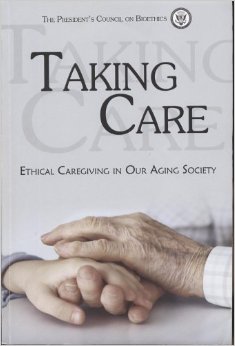The President's Council on Bioethics, Washington, DC, September 2005.
Excerpt:
American society is aging—dramatically, rapidly, and largely well. More and more people are living healthily into their seventies and eighties, many well into their nineties. With birth rates down, with the baby boomers approaching retirement, we are on the threshold of the first-ever “mass geriatric society.” The fastest growing segment of our population is already the group over 85. Historically speaking, it is the best of times to be old.
Yet the blessings of greater longevity are bringing new social challenges. Although people are living healthier longer, many are also living long enough to suffer serious age-related chronic illnesses, including dementia. Alzheimer’s disease now afflicts more than four million Americans, and the number is expected to triple before mid-century. Already by far the most common trajectory toward death is a lengthy period of debility, frailty, and dementia lasting not months but years. Already millions of American families are struggling nobly to provide steady and demanding long-term care for their incapacitated loved ones, often with little respite or communal support, usually for many years. Yet precisely as the need for caregiving rises greatly, the number of available caregivers—both professional and volunteer—is dwindling. We appear to be on the threshold of a crisis in long-term care.
Table of Contents:
Letter of Transmittal
Members of the President’s Council on Bioethics
Council Staff and Consultants
Preface
Chapter 1: Dilemmas of an Aging Society
Chapter 2: The Limited Wisdom of Advance Directives
Chapter 3: The Ethics of Caregiving: General Principles
Chapter 4: Ethical Caregiving: Principle and Prudence in Hard Cases
Chapter 5: Conclusions and Recommendations
Appendix: Personal Statements
Glossary of Terms
Thematic Bibliography
Online:
[pdf]
Amazon

